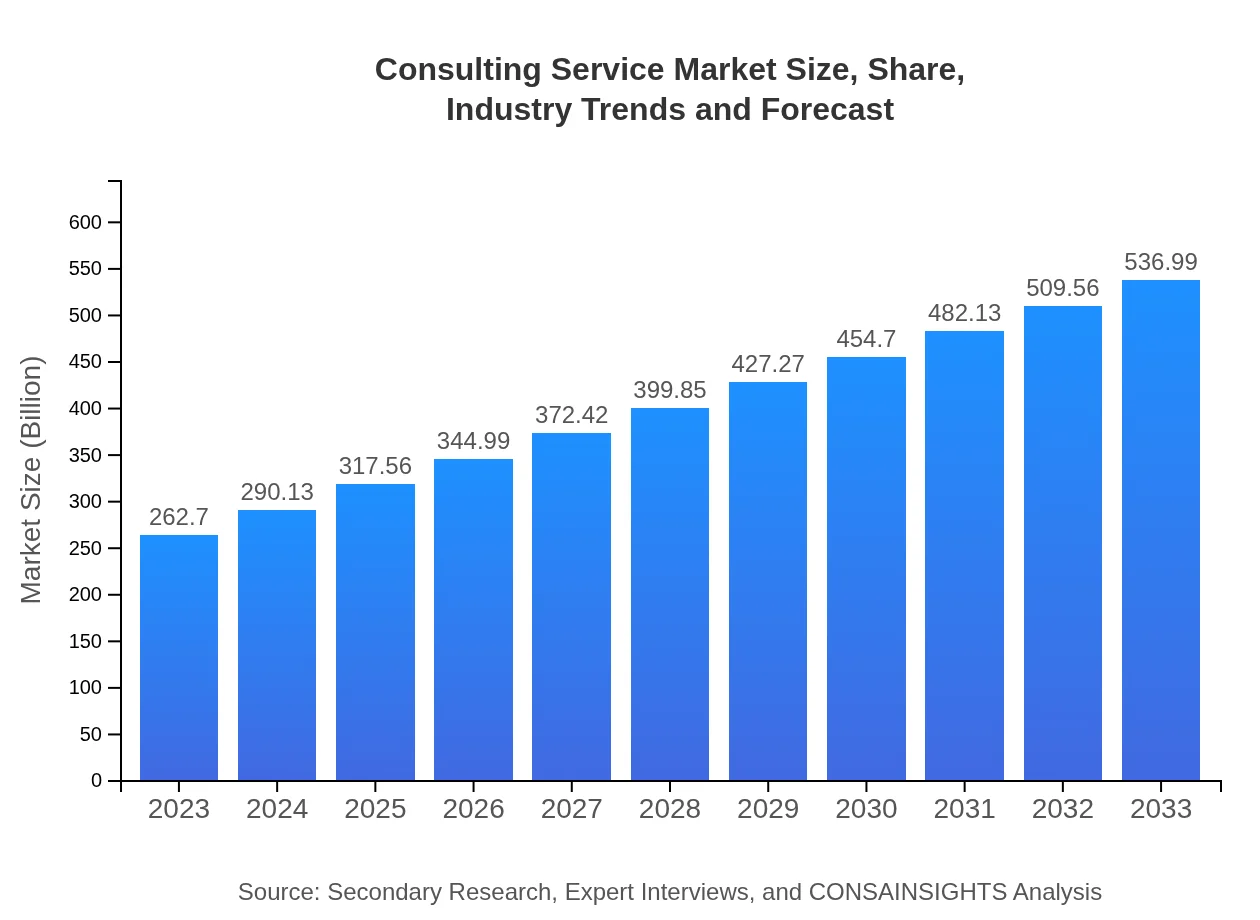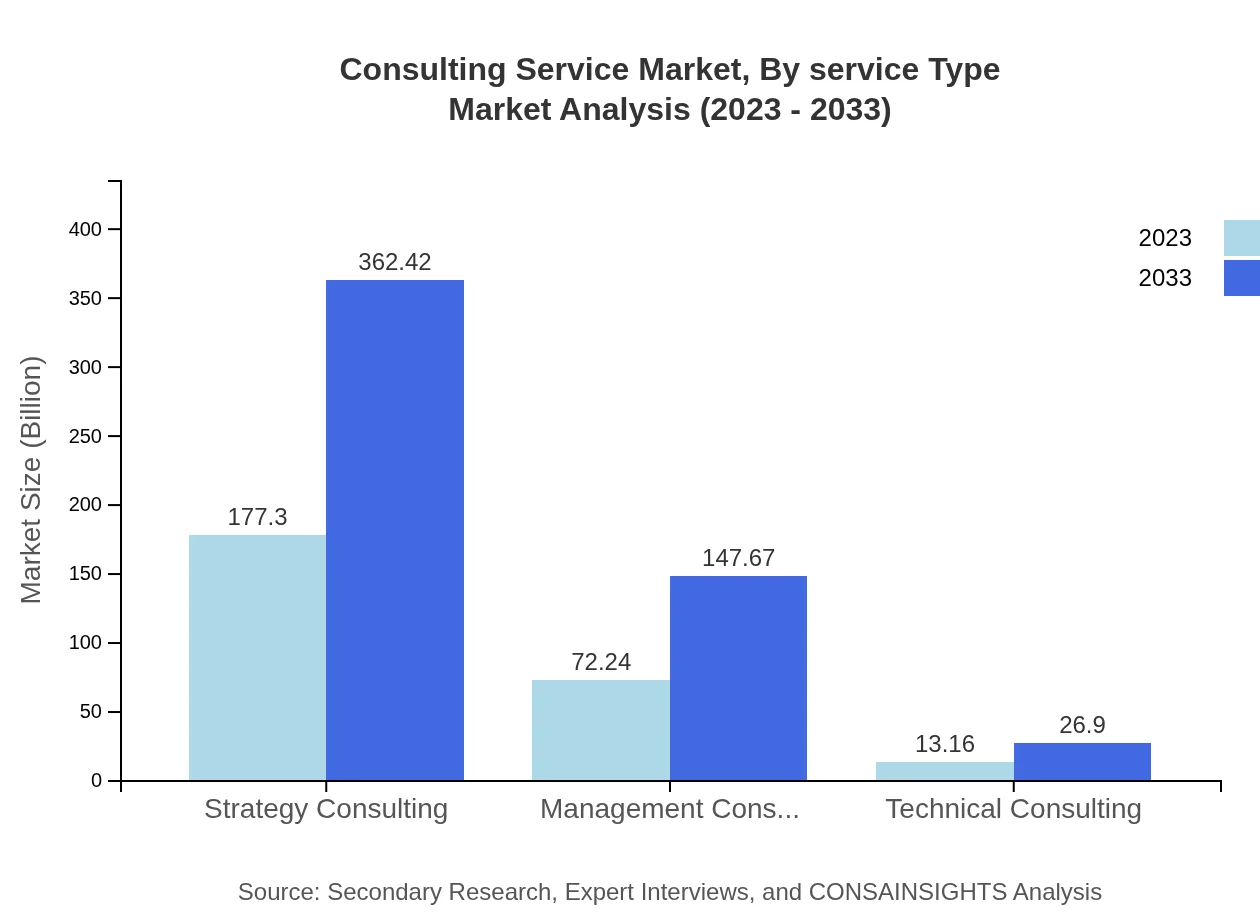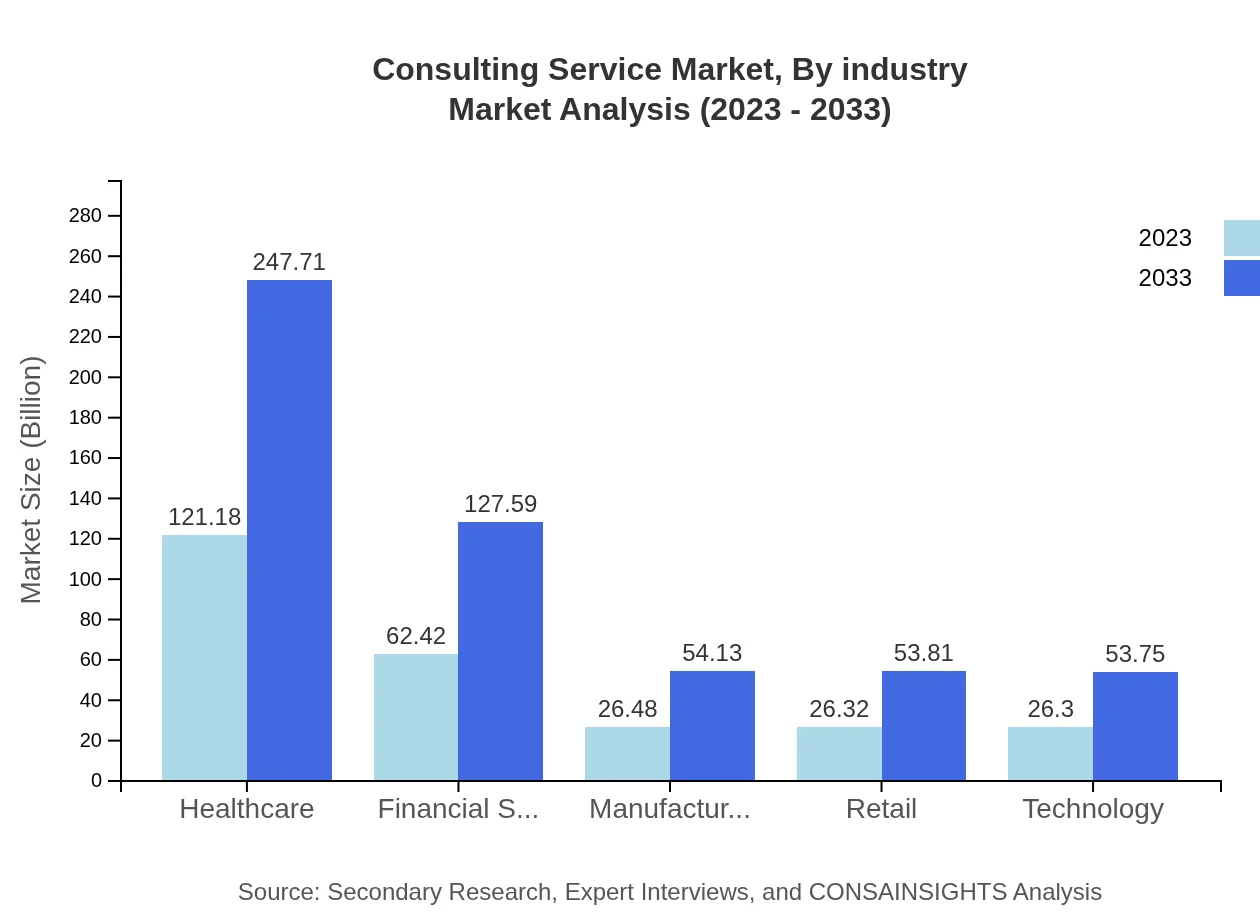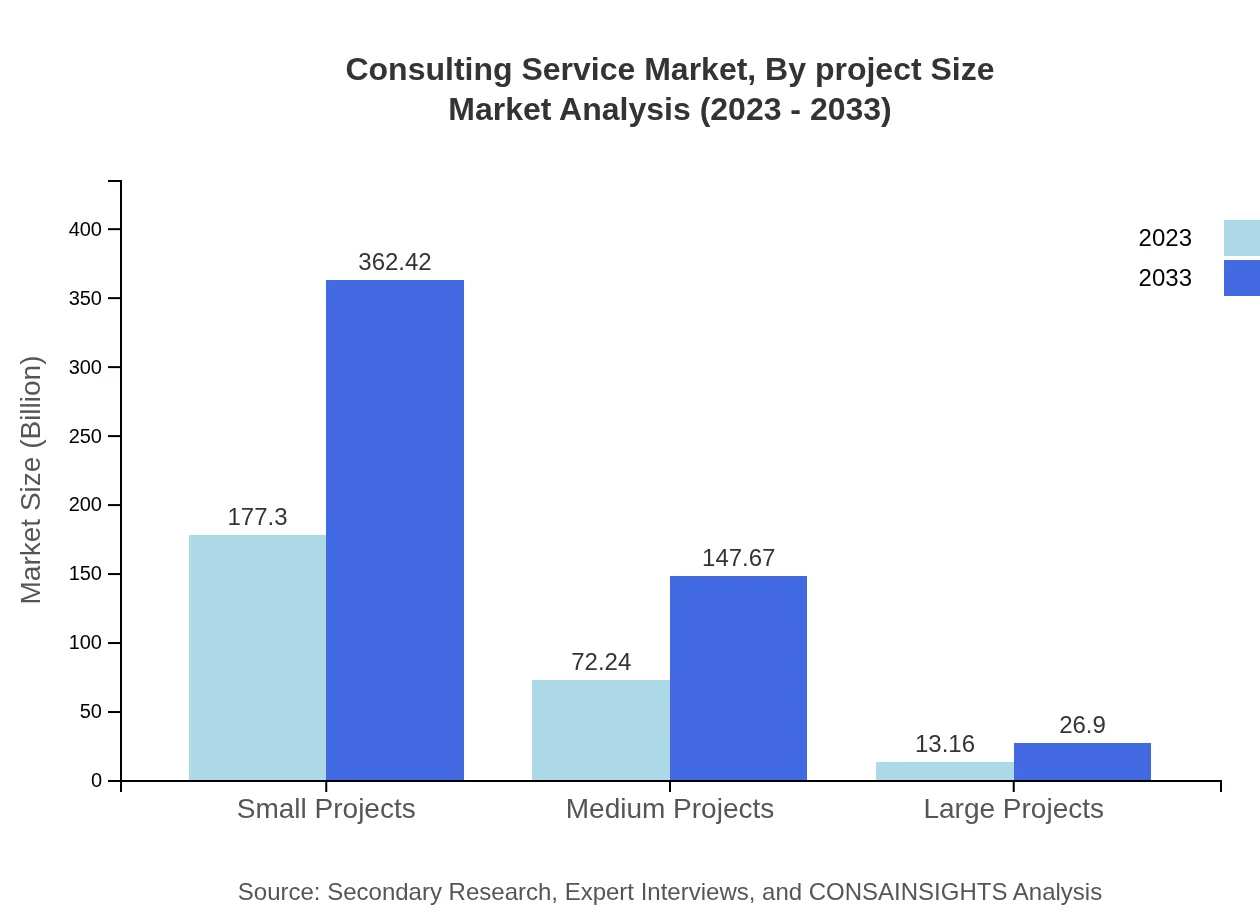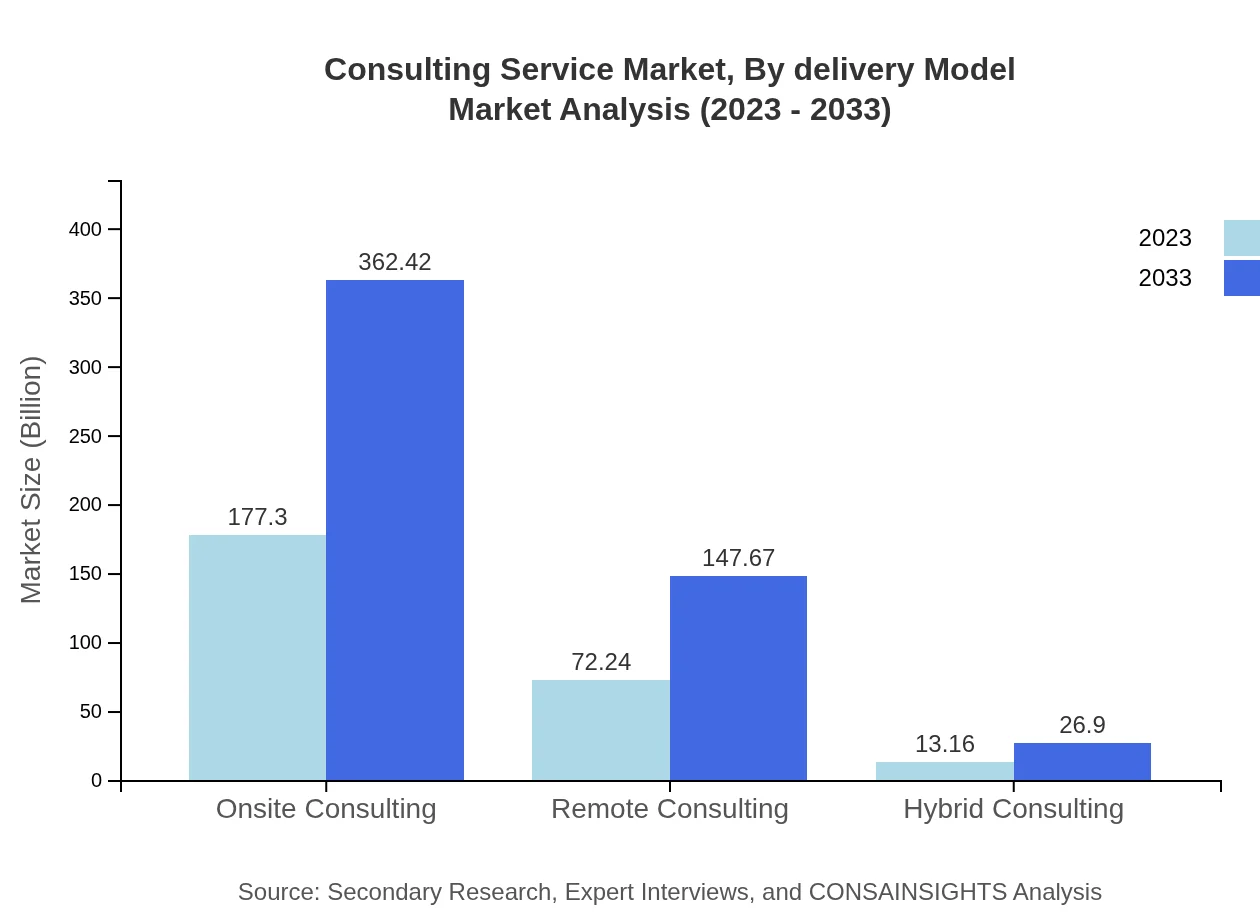Consulting Service Market Report
Published Date: 31 January 2026 | Report Code: consulting-service
Consulting Service Market Size, Share, Industry Trends and Forecast to 2033
This report provides a comprehensive overview of the Consulting Service market from 2023 to 2033, including market size, growth rates, industry analysis, regional insights, and key trends that influence the sector's evolution.
| Metric | Value |
|---|---|
| Study Period | 2023 - 2033 |
| 2023 Market Size | $262.70 Billion |
| CAGR (2023-2033) | 7.2% |
| 2033 Market Size | $536.99 Billion |
| Top Companies | McKinsey & Company, Boston Consulting Group (BCG), Deloitte Consulting, Accenture, PricewaterhouseCoopers (PwC) |
| Last Modified Date | 31 January 2026 |
Consulting Service Market Overview
Customize Consulting Service Market Report market research report
- ✔ Get in-depth analysis of Consulting Service market size, growth, and forecasts.
- ✔ Understand Consulting Service's regional dynamics and industry-specific trends.
- ✔ Identify potential applications, end-user demand, and growth segments in Consulting Service
What is the Market Size & CAGR of Consulting Service market in 2023?
Consulting Service Industry Analysis
Consulting Service Market Segmentation and Scope
Tell us your focus area and get a customized research report.
Consulting Service Market Analysis Report by Region
Europe Consulting Service Market Report:
The European Consulting Service market is expected to increase from $65.18 billion in 2023 to $133.23 billion by 2033, as businesses continue to seek expert guidance on increasingly stringent regulations and sustainability targets, fueling the demand for consulting expertise across various sectors.Asia Pacific Consulting Service Market Report:
The Asia Pacific region's Consulting Service market is anticipated to grow from $50.25 billion in 2023 to $102.73 billion by 2033. This growth is driven by rapid economic development, increasing urbanization, and businesses' rising awareness of consulting capabilities, particularly in technology and management services.North America Consulting Service Market Report:
In North America, the Consulting Service market is projected to grow from $87.48 billion in 2023 to $178.82 billion by 2033. The region benefits from a well-established consulting ecosystem, robust technological advancements, and an increasing focus on digital transformation driving high demand for specialized consulting services.South America Consulting Service Market Report:
South America's Consulting Service market size is expected to expand from $24.77 billion in 2023 to $50.64 billion in 2033. This growth is largely supported by ongoing economic reforms, infrastructure development, and a growing need for consultancy in diverse sectors such as agriculture and renewable energy.Middle East & Africa Consulting Service Market Report:
The Middle East and Africa market is projected to see growth from $35.02 billion in 2023 to $71.58 billion by 2033. Factors contributing to this growth include diversification efforts in Gulf economies, investment in technology, and a focus on improving operational efficiencies across industries.Tell us your focus area and get a customized research report.
Consulting Service Market Analysis By Service Type
In 2023, the Healthcare consulting segment is leading with a market size of $121.18 billion and projected to grow to $247.71 billion by 2033. Similarly, Financial Services consulting is expected to increase from $62.42 billion to $127.59 billion over the same period, reflecting the ongoing transformation in the financial sector. Manufacturing consulting, Retail consulting, and Technology consulting also demonstrate substantial growth potential but on a slightly smaller scale.
Consulting Service Market Analysis By Industry
The industry analysis shows that healthcare consulting maintains the highest market share at 46.13% in 2023, expected to remain stable by 2033. Financial Services and Manufacturing follow, accounting for shares of 23.76% and 10.08%, respectively. With increasing digitalization, the technology consulting sector is also gaining share, projected at 10.01%.
Consulting Service Market Analysis By Project Size
Small projects dominate the market with a size of $177.30 billion in 2023 and projected to reach $362.42 billion by 2033, representing 67.49% market share. Medium projects are expected to grow significantly from $72.24 billion to $147.67 billion, whereas large projects will see more modest growth from $13.16 billion to $26.90 billion.
Consulting Service Market Analysis By Delivery Model
Onsite consulting leads the market segment with a size of $177.30 billion in 2023, expected to double to $362.42 billion by 2033, with a market share of 67.49%. Remote consulting follows with $72.24 billion in 2023 and will grow consistently over the decade, while hybrid consulting, although smaller, will also see steady growth in adoption.
Consulting Service Market Trends and Future Forecast
Tell us your focus area and get a customized research report.
Global Market Leaders and Top Companies in Consulting Service Industry
McKinsey & Company:
A global leader in management consulting, McKinsey & Company specializes in strategy, operations, technology, and marketing consulting, serving a vast range of industries worldwide.Boston Consulting Group (BCG):
Known for its innovative approach and data-driven insights, BCG provides strategic consulting services to help businesses improve their overall effectiveness and global reach.Deloitte Consulting:
One of the largest professional services networks in the world, Deloitte Consulting offers a broad range of consulting services that include strategy, technology, and human capital.Accenture:
Accenture excels in digital, cloud, and security consulting, helping organizations achieve high performance through technology solutions and strategic insights.PricewaterhouseCoopers (PwC):
PwC has a strong presence in consulting services, focusing on risk, financial advisory, and business transformation consulting to navigate today’s complex business landscape.We're grateful to work with incredible clients.









FAQs
What is the market size of consulting Service?
The global consulting service market is valued at approximately $262.7 billion in 2023 and is projected to achieve a CAGR of 7.2%, reaching significant growth by 2033.
What are the key market players or companies in this consulting Service industry?
Key players include McKinsey & Company, Boston Consulting Group, Deloitte, Accenture, and PwC, all of which are influential in shaping market trends and strategies.
What are the primary factors driving the growth in the consulting service industry?
Growth drivers include increased demand for digital transformation, advancements in technology, globalization, and the need for expert guidance in volatile markets.
Which region is the fastest Growing in the consulting service?
The fastest-growing region is North America, expected to expand from $87.48 billion in 2023 to $178.82 billion by 2033, driven by technological innovation and demand for strategic consulting.
Does ConsaInsights provide customized market report data for the consulting Service industry?
Yes, ConsaInsights offers tailored market reports that cater specifically to the unique needs and requirements of clients within the consulting service industry.
What deliverables can I expect from this consulting Service market research project?
Deliverables include comprehensive market analysis, insights on trends, competitive landscape assessments, and data-driven strategic recommendations.
What are the market trends of consulting Service?
Key trends include the rising use of technology-enabled services, a shift toward remote consulting, and an increased focus on sustainability and social impact within client engagements.

